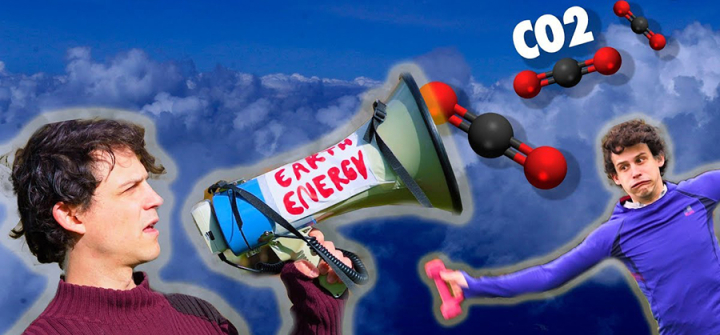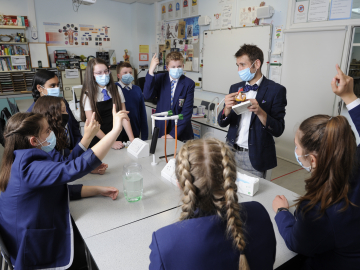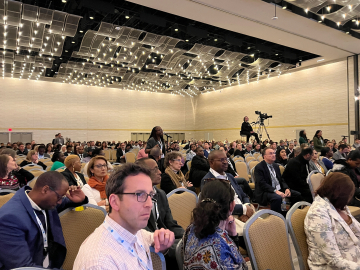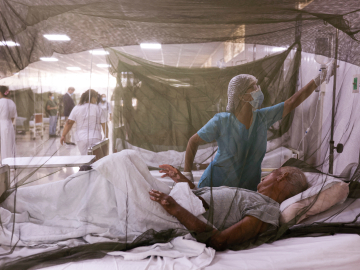The Gospel of ClimateAdam: Comedy That Laughs With—Not At—Climate Change
A few days into 2019, ClimateAdam is in the early stages of Veganuary—the climate change YouTuber’s annual struggle to avoid things like “milk, eggs, bearskin rugs.”
After receiving a doctorate in atmospheric physics from University of Oxford, Adam Levy answered a calling to preach the gospel of climate change science. Given the overwhelming scientific consensus that climate change is real and human-caused, he decided his time was better used as a communicator. Now, the science communicator, journalist and former co-host of the Nature Podcast plays both skeptic and scientist as ClimateAdam.
ClimateAdam deploys a motley crew of unlikely supporting characters to demystify and explain the finer points of climate science: A plate of ravioli, a woolly sweater, a gin & tonic, Mars, online dating, a cup of fictional arsenic that ruins a “perfectly good dinner to make a point about CO2“—and of course, ClimateMadam.
Levy spoke to GHN’s Annalies Winny about the legacy of 2018, what needs to happen next, and why, even though COP24 climate talks left him in despair, he’s still more hopeful than ever.
Who is ClimateAdam and where does he come from?
A guy I met in a pub inspired my first video. When I told him I was studying climate change, he said, “Here’s something that will disprove your climate change,” like it was something I had personally invented. Pointing to his gin and tonic, he said, “When the ice melts, the level of the drink won’t go up or down. So why are scientists going on about sea level rise? If the level of my drink won’t go up when the ice melts, why should the level of the seas go up when the ice melts on Earth?”
I took a deep breath and said, “Well, there’s ice on land, and when that melts it will flow into the seas and that will raise the sea levels. Also, when water heats up it expands a bit, which we can’t notice with a tiny gin and tonic, but with the oceans that can make a huge difference.” His response—“Okay, fair enough”—was life-changing for me. I thought, “Oh my God ... I need to talk about climate change more.”
Why is humor so central to ClimateAdam?
Climate change can be such an abstract, intangible, intimidating thing … humor is a way to make it less daunting.
ClimateAdam knows about the science of climate change, but in all other regards the character is a bit of an idiot. I hope that feels less like a lecture. I try not to make light of climate change; I’m making light of myself. I can remember asking these questions myself, so I definitely sympathize.
The thing I try to do the most with ClimateAdam is to tell stories in a playful style. I hope people will just enjoy the videos and learn something in the process.
Why did you become a YouTuber instead of a researcher? Did you think something was missing from the broader conversation?
While working on my doctorate, I met loads of academics doing really amazing cutting-edge research. But, there’s a huge gulf between that and the level of the public or political conversation. A lot of the most important scientific questions about climate change had been answered, but those answers weren’t being taken into account in public opinion or policy. And so I decided a better use of my time would be helping people understand the scientific knowledge that already existed.
The more superficial reason is that I enjoyed talking about research more than I enjoyed doing it myself.
How often do you encounter climate skeptics?
I speak to people all the time who deny that the world is warming, or think it’s getting warmer but it’s not down to humans. These are not interesting questions scientifically at all; for ages the scientific community has been certain that the world is unambiguously warming and there’s no sensible explanation for the pattern of climate change other than humans. Yet I’m constantly meeting doubters. Even with people who get it, there’s still a lot of misunderstanding about what needs to happen to stop climate change and how to do it.
Do you empathize with climate skepticism at all? Do you think it comes from fear?
I don’t think I can say there’s one cause, but I think the fact that it’s terrifying and that every aspect of our lives is implicated is a factor. There’s no villain we can just point at and say, “It’s your fault.” I mean, there are some villains, but we are amongst them. It’s very difficult to accept. But at the same time we do have to accept that there is a lot of misinformation very actively put out there.
Take Exxon. Internal memos revealed they understood the threat of climate change, but publicly sowed a lot of doubt.
What’s the biggest lesson you’ve learned about climate change in 2018?
The Intergovernmental Panel on Climate Change report was really eye-opening to me on what limiting global warming to 1.5 degrees would mean for the world. That had always been, for me and I think for a lot of people, quite an abstract goal. There really wasn’t much scientific research about it when I was doing my PhD. An unsettling thought is that limiting global warming to 1.5 degrees is an incredibly difficult task. Even if everyone tried as hard as possible, it would still be an incredible challenge. And the reality is that everyone’s not trying as hard as they could.
You wrote in the Guardian in 2017 about your optimism for that year. But you returned from COP24 in despair over what you’d seen. What changed?
I should say I’m a little more optimistic than I was a few years ago, when doing nothing about climate change was the norm. Now the expectation is that we will do something. We’ve got the Paris deal. It’s not perfect, and even if we manage to stick to it, we’re not on track to limit global warming to 1.5 or even 2 degrees. But it has set a precedent.
I felt dejected going into Katowice because global emissions went up by almost 3% in 2018. That felt like a kick in the stomach, because we need to get emissions down to zero pretty fast if we’re going to avoid the worst effects. Seeing negotiations about the Paris Agreement process carry on as if that would be enough, when clearly it wouldn’t be, was frustrating and upsetting.
It took you 24 hours on trains and buses to travel to Katowice without getting on a plane—what was it like to finally be there?
I really hated it, to be honest. It felt like a whole bunch of theater—a performance that progress is being made. But the only thing that actually matters is what’s happening to the levels of carbon dioxide in the atmosphere, and they are still accelerating upwards.
I’m not a policy person, so it’s very hard for me to say what the right process is. But this conference tried to get the whole world to agree on a single rulebook—a very difficult challenge. Active conversation about increasing countries’ ambition would have been great.
What advice do you have for climate science students?
I used to think that I had to be impartial. But I’m not impartial about something that would cause disruption to the entire planet. I feel quite strongly about that, and pretending to be neutral and impartial would be disingenuous.
It’s okay to feel and to communicate emotion. I think that’s very important, and I don’t think it delegitimizes the message at all.
You can subscribe to the ClimateAdam YouTube channel here: https://www.youtube.com/channel/UCCu5wtZ5uOWZp_roz7wHPfg?sub_confirmation=1
This interview has been lightly edited for clarity and length.
Join the tens of thousands of subscribers who rely on Global Health NOW summaries and exclusive articles for the latest public health news. Sign up for our free weekday enewsletter, and please share the link with friends and colleagues: http://www.globalhealthnow.org/subscribe.html
Adam Levy, working to change the way people talk about climate change. Image: Courtesy





